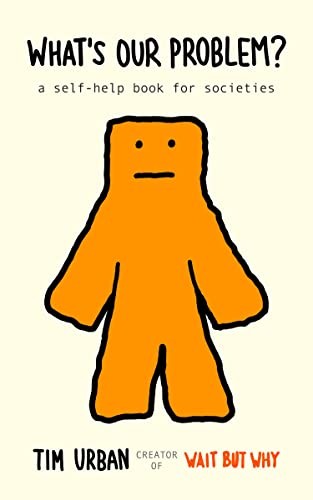Jesper reviewed What's Our Problem? by Tim Urban
Review of "What's Our Problem?" on 'Goodreads'
2 stars
Update: please go read the review on Put A Num On It here for a much deeper analysis of some points that the book hopelessly misses: putanumonit.com/2023/03/06/whats-not-our-problem/
Update 2: FIRE (the Foundation for Individual Rights and Expression) which this book cites for a lot of its data in chapters 5-7, is funded in large part by the Koch brothers and other right-wing foundations (read www.alternet.org/2016/09/what... for more details). Hence it seems that Tim Urban has fallen into the very trap that he is warning us for in this book - he has joined one side of the tribal battle on "free speech". While I still can recommend reading this book, I would take chapters 5-7 with a large grain of salt and view it as a cautionary tale that just knowing about these problems does not stop you from falling into the very same trap yourself.
Original review: After Tim Urban abandoned his blog series "The Story of Us" (web.archive.org/web/20230129233043/waitbutwhy.com/2019/08/story-of-us.html) and announced this book, I started looking forward to finally getting to the conclusion of this magnum opus, the part where the author would be done describing the problems in our modern society and finally start talking about the solutions to these problems. Now, three years later, I am at the end of his book and I have mixed feelings. On the one hand, I am disappointed that the book only talks about actual solutions in its final 10 pages, and as a result those solutions are rather broad and vague. On the other hand, I feel like I now have a much better understanding of what is actually causing the division in our society.
So let's talk about what this book is about. Tim Urban is one of the few writers who I would trust to make an honest and considered argument even if they wrote a 500 page book on why I should start killing babies and drink their blood. And that's a good thing, since the argument Tim makes here will be as disgusting to many people: the idea that most current social justice organizations (at least in the US, but increasingly also in Europe) are using strategies that are illiberal, authoritarian, and contra-productive to their own stated goals. It is easy to read the previous sentence and dismiss this as yet another worthless opinion of a racist, bigoted, white man. Hence it is important to note here that Tim does not argue against any of the object-level ideas or goals of social justice (nor does he argue in favor of them), but only with the methods they started using increasingly in the recent years.
The way Tim makes this argument is by distinguishing two dimensions in human thinking: what we think (e.g. left vs right in politics), and how we think (low-rung vs high-rung). On this second dimension, he defines high-rung thinking as being open to changing your mind, welcoming dissenting views, and in general being more attached to truth than to any idea in particular, and low-rung thinking as being unable to change your mind and forcing your ideas upon others through manipulation and coercion. With lots and lots of examples (seriously, there are so many of them, you have to read it to believe it) he argues that the core conflict that is happening is not left versus right, but low-rung thinking trying to overpower high-rung thinking, and succeeding. If you are anything like me, you will be annoyed or offended many times while reading the book because it seems like Tim is arguing against noble ideas such as equal rights and anti-discrimination, before realizing that no, he is not arguing against any of that but rather against trying to force them upon others while silencing any dissenting voices.
I have two main criticisms of this book: one, that it is too much focused on the US over other parts of the world (as the author admits himself) and two, that it takes almost 400 pages to describe in great detail what he identifies as the problem while only talking about solutions in the final 10. So what are these solutions, you ask? Here is my summary of those 10 pages:
- Realize that you do not know everything and are often wrong
- Think about where your primitive mind is holding the reins
- Keep questioning your beliefs and values
- Seek the merit in the beliefs of those you disagree with
- Humanize your opponents and feel compassion for them
- Notice when you are thinking on the low rungs, and remind yourself that it happens to everyone
- Expose yourself to high-rung ideas from across the spectrum
- View society and politics through a vertical lens of high rung versus low rung
- Stop saying things you don't believe
- Start saying what you really think, in private, with people you trust
- Help groups transform from echo chambers into idea labs
- Go public with your controversial ideas, if you can
These seem like somewhat obvious but still useful pieces of advice to me.
So is this the book I had hoped it to be after reading "The Story of Us"? No, pretty far from it. But I don't think it is useful to criticize something for what it doesn't, and instead criticize it for what it does. What it does is highlight a really important aspect of how our society works, what is going wrong with it, and why this is a big problem and we should all care about it. The book does so despite the inherent difficulty with doing so, namely that what's going wrong is exactly that it is getting more and more difficult to criticize and argue in good faith. For that, I wholly respect and admire Tim Urban, and I am grateful that he wrote this.

